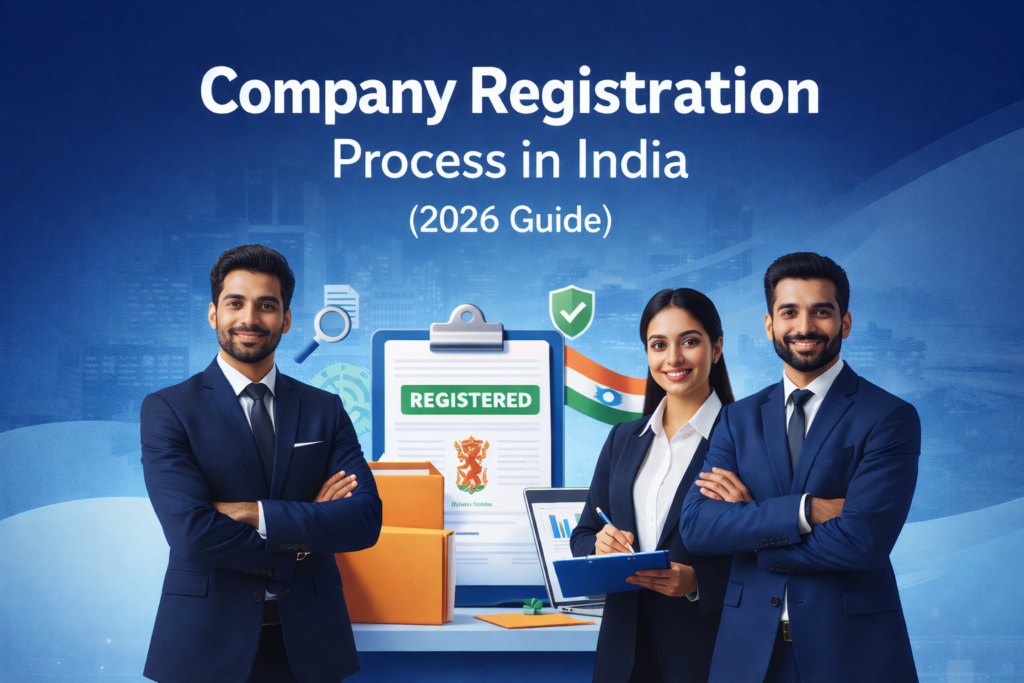Startup Incorporation in India: A Complete Guide for New-Age Entrepreneurs

Entrepreneurship is experiencing a golden age in India. Now is the ideal moment to turn your concept into a registered company given a growing investor interest, a supportive regulatory environment, and a vibrant startup ecosystem. One essential action lies between you and your ambition before you seek your first round of investment or launch your product: startup incorporation in India.
Every successful startup is built on a strong basis. Including your startup is about creating the structure for scalability, investor preparedness, credibility, and long-term success as well as fulfilling legal criteria. This tutorial will cover all you need to know about startup incorporation in India—types of business structures, incorporation procedures, necessary papers, and how Bizsimpl can simplify the whole process.
Why Startup Incorporation in India Is Crucial
Incorporation is more than simply getting a certificate from the Ministry of Corporate Affairs (MCA). It establishes the identity, legitimacy, and operating limits of your startup. Here is the justification for startup incorporation in India being a requirement:
✅A registered company earns more confidence from consumers, partners, and investors.
✅Angel investors and venture capitalists want to put money into registered companies.
✅A corporation survives beyond the participation of the original founders.
✅Your personal belongings stay safe in event of corporate debts or losses.
✅Incorporation provides transparency in operations, ownership, and decision-making.
Common Business Structures for Startup Incorporation in India
Choosing the appropriate structure is essential for startup incorporation in India. From legal requirements to fundraising possibilities, the correct entity influences all. These are the three most popular choices:
1.Private Limited Company (Pvt Ltd)
Especially for businesses looking for outside capital and growth, the most common framework is this one.
Main Characteristics:
- Needs at least two directors and two stockholders.
- Perfect for companies looking to generate money.
- All shareholders have limited liability.
- Qualified for several entrepreneurial perks under the entrepreneurial India program.
Best suited for: Scalable service firms, product-based enterprises, tech startups.
2. Limited Liability Partnership (LLP)
Combining the advantages of a partnership with limited liability, LLPs are appropriate for new businesses wanting less paperwork and flexibility.
Main Characteristics:
- Needs two partners—individuals or business entities.
- Not as much compliance as a Pvt Ltd company.
- All partners have little liability protection.
- Partners may share profits flexibly.
Best suited for: Bootstrapped companies, consultancy organisations, professional service providers.
3. One Person Company (OPC)
A wonderful option for single entrepreneurs who desire the benefits of a business without requiring a co-founder or partner.
Main Characteristics:
- A single individual can start.
- Provides legal protection and little responsibility.
- Easier compliance than Pvt Ltd.
- May eventually change into a Pvt Ltd business.
Best suited for: Consultants wishing for a corporate framework, freelancers, and solo business owners.
Step-by-Step Process of Startup Incorporation in India

Startup incorporation in India is a series of legal steps guaranteeing your company’s official government recognition. Here is a simplistic analysis:
Step 1: Decide Your Business Structure
Based on your startup objectives, number of founders, and potential financial requirements, determine the most appropriate business type—Pvt Ltd, LLP, or OPC.
Step 2: Name Reservation via RUN (Reserve Unique Name)
Post name suggestions on the MCA site. Select a distinctive name that follows government rules and best represents your brand.
Step 3: Obtain Digital Signature Certificate (DSC)
To sign incorporation papers digitally, all suggested directors must have a DSC.
Step 4: Apply for Director Identification Number (DIN)
A DIN must to be given to all directors if not already acquired. The SPICe+ form is used for this.
Step 5: File and Prepare SPICe plus form
Covering name reservation, incorporation, PAN, TAN, and EPFO registration, SPICe+ is the combined corporate registration form.
Required papers:
- Directors’ identity and address verification
- Photos of passport size
- Evidence of registered office address
- Memorandum of Association
- Articles of Association
Step 6: Certificate of Incorporation
Approved, the Registrar of Companies (RoC) grants a Certificate of Incorporation—your company’s official birth certificate.
Step 7: Compliance After Incorporation
This include establishing a business bank account, designating an auditor, and other compliance requirements particular to your company structure.
How Bizsimpl Makes Startup Incorporation in India Easy
Starting a company should not be difficult, time-consuming, or complicated. Bizsimpl fits in there.
Bizsimpl is an expert in simplifying Startup Incorporation in India. Bizsimpl guarantees you concentrate on developing your company while we manage the bureaucracy from selecting the appropriate organisation structure to managing end-to-end documentation, compliance, and MCA filing.
Why Select Bizsimpl?
- Register your startup in any Indian state, hassle-free.
- Personalised meetings to assist you choose the appropriate company structure.
- Just simple, quick service with no hidden expenses or pointless delays.
- Our efficient crew guarantees quick turnaround by providing real-time updates and faster processing.
Bizsimpl guarantees your startup is officially ready to grow from day one whether you are formalising an existing company or starting your first.
Common Errors to Avoid During Startup Incorporation in India
Although including a startup could appear easy, many business owners fall into typical traps that could complicate or postpone the process. Steering clear of these traps guarantees a quick and seamless implementation.
- Picking the Incorrect Business Structure
Choosing a structure without knowledge of team size, future funding intentions, or compliance obligations could be disastrous. A Pvt Ltd business could be excessive for a single founder while an LLP might not be perfect for venture capital financing. - Faulty or Incomplete Records
Mistakes in shareholder information, identity papers, or address proof might cause application denials. Make sure all papers are current and correctly scanned. - Disregarding the Need of Name Approval
Rejection results from submitting names too generic or similar to those of already registered businesses. Suggest unique, brandable names using the MCA name rules. - Missing Required Compliance Following Incorporation
Many new businesses overlook post-incorporation responsibilities such keeping a registered office, naming an auditor, and creating a bank account. These are absolutely vital for lawful operation.
From the initial document to your incorporation certificate, Bizsimpl guides every stage of your startup incorporation in India journey with professionals guaranteeing correctness and compliance.
Essential Legal Papers Needed for Startup Incorporation in India

The incorporation procedure is essentially one of documentation. Usually, a Pvt Ltd, LLP, or OPC will need this:
For Directors/Partners/Shareholders:
- PAN card required for Indian nationals
- Passport or Aadhaar card
- Photo in passport size
- Proof of address (bank statement, utility bill)
- Digital Signature Certificate DSC
For the Registered Office:
- Proof of address (property tax receipt or utility bill)
- If rented, no objection certificate (NOC) from the owner.
- Property ownership paperwork or rent agreement
Business Constitution Papers:
- Memorandum of Association (MoA)
- Articles of Association
- Agreement of partnership (for LLP)
Bizsimpl makes sure all needed papers are checked and properly filed to prevent any holdups in your Indian startup incorporation.
Last Pre-Incorporation Checklist
Run through this fast checklist before you “submit” your incorporation application:
- ✅ Chosen a distinctive
- ✅MCA-compliant business name
- ✅ Collected and scanned all relevant documents
- ✅ Applied for DSC and DIN
- ✅ Prepared MoA and AoA
- ✅ Selected a registered office address
- ✅ Selected a reliable incorporation partner such as Bizsimpl
Mistakes that could delay the startup incorporation in India procedure are avoided with the help of this checklist.
Commonly Asked Questions
How soon does Indian startup incorporation happen?
Usually, depending on document preparedness, name approval, and MCA processing periods, it takes 7–12 business days. Bizsimpl’s quick assistance makes the procedure even quicker.
May I set up a business without really going to any office?
Absolutely. In India, startup incorporation is entirely digital. Bizsimpl handles all submissions online and offers real-time information.
Must I have a physical office to register my startup?
Absolutely. One must have a registered office address. As long as you offer legitimate address verification and a NOC from the property owner, it may be a commercial or residential space.
May one founder launch an Indian business?
Of course. A One Person Company (OPC) is meant for single business owners wishing for the advantages of incorporation without a co-founder.
Which should I pick: OPC, LLP, or Pvt Ltd?
This relies on your company vision:
- Select Pvt Ltd if you want to expand quickly or seek money.
- If you are launching a service company based on partnership, pick LLP.
- If you wish to formalise your company going solo, use OPC.
Unsure what fits you best? Bizsimpl can assist you to choose depending on your startup objectives.
Why Now Is the Ideal Time for Startup Incorporation in India
Opportunities abound in India’s startup ecosystem. Government programs such as Startup India, more straightforward access to money, and growing internet penetration are helping to create the ideal storm for entrepreneurial success. Formalising your startup helps you:
- Open qualification for startup funding and advantages.
- Establish yourself as a reliable and investable company
- Take charge of branding, equity, and compliance.
Startup incorporation in India is not just a formality — it’s your launchpad to the market. And the sooner you start, the better your chances of grabbing the right opportunities at the right time.
Establish Your Company using Bizsimpl
Bizsimpl is not only incorporation specialists; we also help startups get off the ground. We make the most important stage of your entrepreneurial path easier: transforming your concept into a legal, practical, future-ready company.
Bizsimpl offers you:
- 📄 End-to-end documentation support
- 💼 PAN-India registration for Pvt Ltd, LLP, and OPC
- ⚙️ Error-free compliance and MCA filings
- 📍 Dedicated support from startup specialists
Thousands of entrepreneurs trust Bizsimpl for startup incorporation in India — and you should too.
Prepared to Include Your Company?
Build the future now; make it official. Bizsimpl is your go-to partner for quick, dependable, and professional startup incorporation in India whether you’re formalising your side hustle or just beginning.
👉 Start Now with Bizsimpl—Your First Step Towards Startup Achievement!
Blog's
Company Registration in Bangalore with BizSimpl Consultancy
Company Registration in Bangalore: Step-by-Step Guide for Startups Company Registration in Bangalore is the first…
Process for Registering a Company in India: Step-by-Step
On This Page What Company Registration Means End-to-End Registration Process Overview Types of Company Structures…
Startup Incorporation in India: Essential Steps and Benefits for New Entrepreneurs
Startup Incorporation in India: Essential Steps and Benefits for New Entrepreneurs India has quickly developed…











